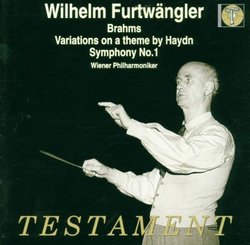| All Artists: Brahms, Furtwangler, Vienna Philharmonic Orch Title: Haydn Variations / Symphony 1 Members Wishing: 0 Total Copies: 0 Label: Testament UK Release Date: 4/14/1998 Album Type: Import Genre: Classical Styles: Historical Periods, Modern, 20th, & 21st Century, Symphonies Number of Discs: 1 SwapaCD Credits: 1 UPC: 749677114220 |
Search - Brahms, Furtwangler, Vienna Philharmonic Orch :: Haydn Variations / Symphony 1
 | Brahms, Furtwangler, Vienna Philharmonic Orch Haydn Variations / Symphony 1 Genre: Classical
|
Larger Image |
CD Details |
CD ReviewsPrimal Brahms from WF Thomas F. Bertonneau | Oswego, NY United States | 11/24/2000 (4 out of 5 stars) "About a dozen recordings exist of Wilhelm Furtwängler (1886-1954) conducting the C-Minor Symphony (No. 1 [1876]) by Johannes Brahms. Consensus confers the highest marks, both for interpretation and sound, on the performance with the Symphony Orchestra of North German Radio, Hamburg, from 1951. Many incarnations of this item exist - a single CD from Tahra, as part of a boxed set of WF's Brahms from Music and Arts. Yet it would be difficult to discount any of WF's "takes" in the Brahms First, excepting perhaps an account with an unprepared Venezuelan orchestra from 1954. Testament offers WF's studio performance of the symphony, recorded with the Vienna Philharmonic for HMV over four days in November 1947, on wax discs, and released in 1948 on eleven 78-rpm sides, with two of Brahms' Hungarian Dances taking up the twelfth side. This playback version differs from the legendary Hamburg recording in not being an uninterrupted performance captured on tape, and the last degree of inner logic which informs the 1951 is perhaps absent here; nor is the sound so good (but in Hamburg, engineer Friedrich Schnapp used magnetic tape). Even so, the characteristic marks of the Furtwänglerian Brahms makes themselves felt: The opening becomes eruptive under WF's baton; he underlines the rhythms prodigiously during the development. One recalls Brahms' own reminiscence about the origins of the symphony, that it came to him while he made a walking tour alone around the island of Rügen in the Baltic Sea amidst the starkness of its insular and storm-tossed geography. In the Second Movement (Andante), WF finds great tenderness, but also, in the duet between clarinet and oboe, a certain concealed tenseness. In the Third Movement (Un Poco Allegretto), he succeeds in reminding us of the tumult of the First Movement; he does so by bringing out the combativeness of the Schumannesque second subject. In the multi-section Finale, WF observes his usual pattern of stepping up the tension grade by grade. The pizzicato passages for low strings in the movement's first section are especially impressive. The entrance of the horn, with its Alpine theme, is not so dramatically effective as in the Hamburg performance, but is still quite galvanizing. The "Haydn Variations" have become the standard companion of the First Symphony on record and Testament holds to the custom with a Viennese performance from 1952, also done in studio for HMV. Good accompanying notes and fine production overall. Listeners feeling eager about WF and Brahms are urged to seek out the 1945 recording of the Finale of the C-Minor, as well as the Lucerne Festival (1947) performance of the whole. (And don't forget Hamburg, 1951!)" Furtwangler was not at his best in the studio Santa Fe Listener | Santa Fe, NM USA | 03/31/2009 (3 out of 5 stars) "I am less enthusiastic about this 1947 Brahms First than the previous reviewer. At the time of its release by Testament, there were six live versions of this work under Furtwangler, and the best are far mroe intense and better structured than this one. Furtwangler was the prime example of a great musician who felt inhibited under studio conditions, and even thogh he must have been glad to return to commercial recording (these were the first sessions permitted after his long, painful de-Nazification by the Allies), no special magic was created. The recorded sound is patchy although by no means the worst he ever received. I imagine the original 78 rpm masters have deteriorated over time.
By the way, even though Furtwangler performed the Brahms First more often than any other work over his long career except for the Beethoven Seventh, he made no commercial recordings of any Brahms symphony until this one in 1947. It would be the only one, in fact, except for an inferior Brahms Second made with the London Phil. by Decca a few years later. The earlier reviewer covers all the relevant details, so I won't repeat them except to correct him when he calls the Haydn Variations a studio recording. It's actually a live recording from 1952, confusing because the location for both works is the same, the Musikverein in Vienna. All in all, I think this well remastered CD licensed from Japanese EMI is chiefly of interest to Furtwangler specialists." |

 Track Listings (14) - Disc #1
Track Listings (14) - Disc #1